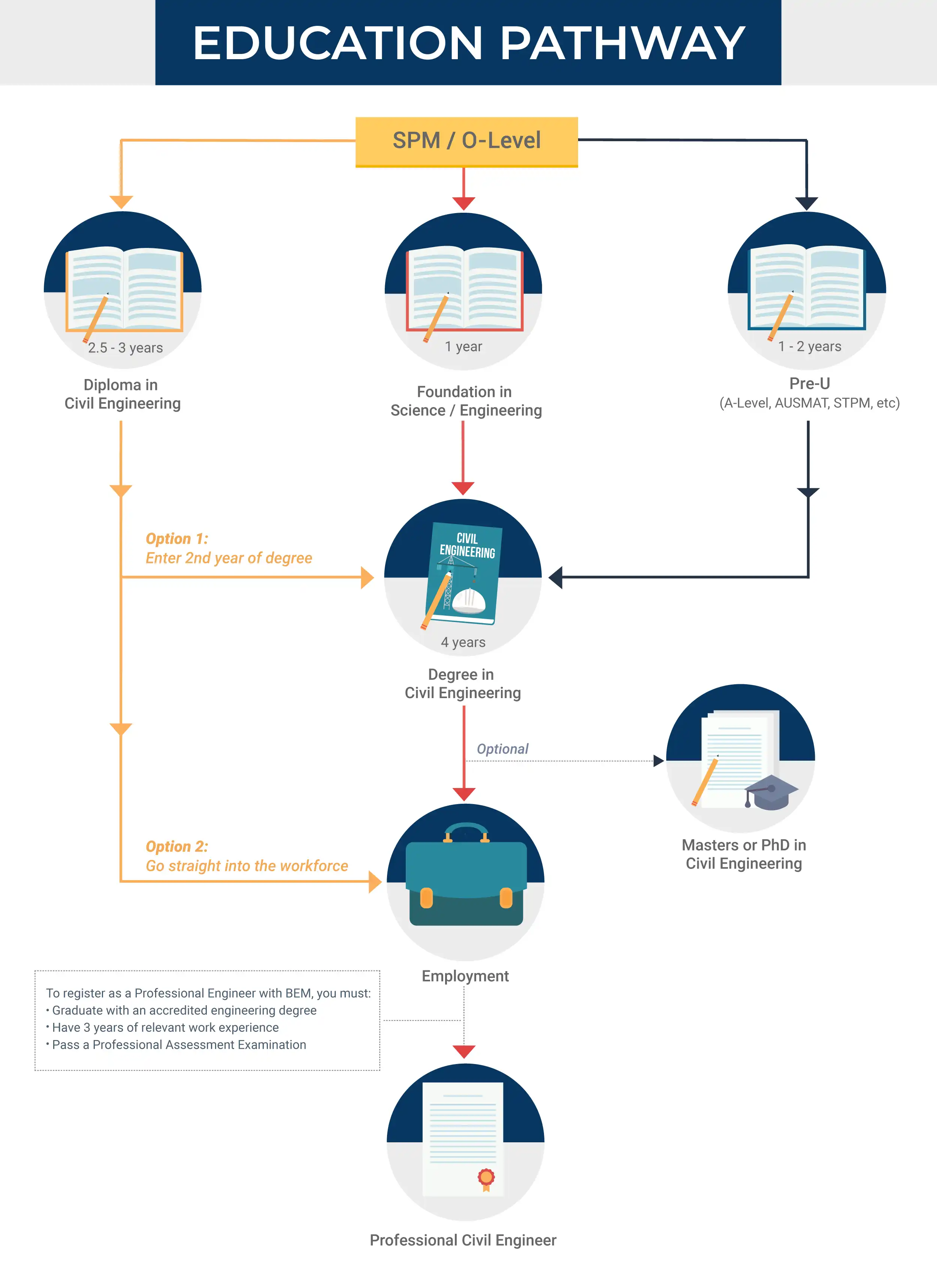The Complete Guide to Studying Civil Engineering in Malaysia
What do you need to qualify for a civil engineering course in Malaysia? Discover the programme, its entry requirements and more with this guide.

Civil engineering is one of the oldest and most important fields in engineering. Just about every aspect of modern civilisation is a construct of civil engineering — the roads and railways that we travel on, the soaring skyscrapers that dot the city skyline, even our ability to access clean and drinkable water.
If this fascinates you, then you’ll want to dive deeper into the field of civil engineering.
This guide will cover everything you need to know about studying civil engineering, such as what civil engineering is, how to become a professional civil engineer in Malaysia, job opportunities for civil engineering graduates and the best universities for civil engineering in Malaysia.
So, if you’re curious about becoming a civil engineer, keep reading for more details!

Heriot-Watt University Malaysia (HWUM)
MEng (Hons) Civil Engineering
✓Accredited by the Board of Engineers Malaysia (BEM) and the Joint Board of Moderators (UK) for the purposes of Chartered Engineer
#1. What is Civil Engineering?

Civil engineering is an engineering discipline that deals with the design, construction and maintenance of the built environment. The field encompasses infrastructure such as roads, buildings, bridges, canals, dams, water supply facilities and sewage systems.
Civil engineers are responsible for making sure that the buildings we live in are safe, the bridges we cross are stable and the pipes that bring us water are sound. They ensure that natural resources are used in the built environment in an effective and efficient manner. They also see to it that the built environment coexists sustainably with the natural environment.
As part of your civil engineering studies, you’ll learn about materials, structures, fluid mechanics, geotechnics, surveying, construction management and environmental studies. This will allow you to design sound structures while taking into account costs, construction methods and other constraints.

Fields of Civil Engineering
As one of the oldest fields of engineering, there are many subdisciplines of civil engineering, all of which lead to different professions. Here are some of the fields of civil engineering.
| Fields | What It Is |
|---|---|
| Environmental engineering | Focuses on preventing harm to the natural environment. This includes water and air pollution control, waste disposal, recycling and wastewater management. |
| Geotechnical engineering | The study of earth materials such as soil and rock. This knowledge is used to safely design foundations, walls and other structures. |
| Structural engineering | Focuses on the framework of structures such as buildings, skyscrapers, bridges and tunnels. Structural engineers ensure the stability, strength and safety of built structures. |
| Transportation engineering | Focuses on the infrastructure that supports the movement of goods and people, whether it’s by land, sea or air. This includes roads, railway systems, mass transit, canals, ports and harbours, airports and runways. |
| Construction engineering | Focuses on the management and delivery of construction projects. Construction engineers are heavily involved in costing, planning, risk analysis and site management. |
#2. Entry Requirements for Civil Engineering
a) Subjects required
In order to study civil engineering, you must have taken these subjects at SPM level or equivalent:
- Mathematics
- Any Science subject, ideally Physics
At A Levels, STPM or equivalent, you need to take the following subjects if you want to study a Degree in Civil Engineering:
- Mathematics
- Physics
b) Requirements for Diploma in Civil Engineering
These are the general entry requirements for a Diploma in Civil Engineering:
- SPM (or equivalent): Minimum 3Cs, including Mathematics and 1 other Science / Technical / Vocational subject, as well as a pass in English
c) Requirements for Degree in Civil Engineering
To pursue a Degree in Civil Engineering, you need to complete a pre-university programme and meet the entry requirements.
- A Levels: Minimum 2Ds including Mathematics and Physics
- STPM: Minimum 2Cs including Mathematics and Physics
- Foundation in Science or Foundation in Engineering: Minimum CGPA of 2.00
- Diploma: Minimum CGPA of 2.00
In addition, it is recommended to have at least a C in Mathematics and 1 other Science / Technical / Vocational subject as well as a pass in English at SPM level.
#3. Studying a Civil Engineering Course
a) What subjects will you study in civil engineering?
A Degree in Civil Engineering will train you to be analytical, critical and creative so that you are able to make evidence-based decisions to solve complex engineering problems.
During the course of your civil engineering studies, you will gain specialist knowledge about the characteristics and structural behaviour of materials, allowing you to design structural components that are safe, sound and cost-effective.
Some of the subjects that you’ll learn include:
- Strength of materials
- Structural analysis and design
- Fluid mechanics and hydraulics
- Soil mechanics / geotechnical engineering
- Civil engineering materials
- Statics and dynamics
- Construction engineering
- Surveying
- Water resources and hydrology
- Highway and transportation
- Environmental studies
In addition to the usual lectures and tutorials, you can expect your studies to include laboratory work, site visits, group and individual projects, and industrial training.
b) How long is a Diploma in Civil Engineering?
A Diploma in Civil Engineering has a duration of 2.5 years.
Upon completing your diploma, you can choose to join the workforce or continue on with your studies with a Degree in Civil Engineering, starting from Year 2.
c) How long is a Degree in Civil Engineering?
A Degree in Civil Engineering is 4 years long.
It’s crucial to note that the Board of Engineers Malaysia (BEM) does not recognise 3-year engineering programmes for registration as a Graduate Engineer.
d) How much does it cost to study civil engineering course in Malaysia?
A Diploma in Civil Engineering costs around RM24,500 – RM44,000. A Degree in Civil Engineering, on the other hand, is approximately RM35,000 – RM209,000.
#4. Your Education Pathway To Become a Professional Civil Engineer in Malaysia

Step 1: Take a pre-university, foundation or Diploma in Civil Engineering
First, upon completion of SPM or an equivalent qualification, you can opt to pursue a pre-university programme such as A Levels or Australian Matriculation, or a Foundation in Science or Foundation in Engineering programme. This will enable you to pursue a Degree in Civil Engineering.
Alternatively, you can also opt for a Diploma in Civil Engineering instead. After that, you can continue on with a Degree in Civil Engineering, starting from Year 2.
Step 2: Complete a recognised 4-year Degree in Civil Engineering
It’s important to note that to be a registered professional civil engineer, you must pursue a recognised 4-year Degree in Civil Engineering. The Board of Engineers Malaysia (BEM) does not recognise 3-year engineering programmes for registration to be a Graduate Engineer in Malaysia.
If your degree is from Malaysia, it must be from a university that’s accredited by the Engineering Accreditation Council of the Board of Engineers Malaysia (BEM). Otherwise, the degree must be from an overseas university which is a signatory to the Washington Accord.
Step 3: Register as a Graduate Engineer and gain practical experience
Once you complete your Degree in Civil Engineering, you can then register as a Graduate Engineer with BEM.
The next step is to work your way to becoming a professional engineer. To do this, you will need to obtain 3 years of practical experience and pass a Professional Assessment Examination conducted by BEM.
Upon meeting this criteria, you’ll be eligible to apply for the status of Professional Engineer.
Step 4: Register as a Professional Engineer
Once you’ve met the criteria to be a professional engineer, you can finally register yourself as a professional engineer with BEM. With this, you can use the abbreviation “Ir.” before your name or “P.Eng.” after your name to denote your professional engineer status.
To summarise, it takes approximately 8 years from SPM to be a professional engineer.

#5. Should You Study Civil Engineering?

a) Is civil engineering right for you?
If you’re wondering whether you should study civil engineering, here are some questions to think about:
- Do you like practical work and building things?
- Do you consider yourself to be analytical with critical thinking skills?
- Do you enjoy tinkering with tools, machinery or gadgets?
- Do you have good grades in Mathematics and Physics?
- Can you think logically and solve complex math problems?
- Are you comfortable with having to make visits to construction sites?
- Do you have a keen interest in the design and structure of buildings and infrastructure?
If you answered yes to the majority of these questions, then civil engineering may be right for you!
b) Skills required to be a civil engineer
Here are some key skills a good civil engineer should have:
- Good analytical and problem-solving skills
- Strong mathematical ability with a good grasp of physics
- Three-dimensional conceptual skills
- Keen attention to detail
- Creative and innovative thinking to solve complex problems
- Ability to work well in a team and liaise with other professionals

Heriot-Watt University Malaysia (HWUM)
MEng (Hons) Civil Engineering
✓Accredited by the Board of Engineers Malaysia (BEM) and the Joint Board of Moderators (UK) for the purposes of Chartered Engineer
#6. Types of Civil Engineering Jobs
As a civil engineering graduate, you’ll be able to find work in both the public and private sectors.
In the public sector, you may be designing engineering facilities, supervising construction projects on behalf of the government or operating and maintaining public infrastructure facilities. If you’re in the private sector, you could work for engineering consultancies, contractors or private developers.
Here are some of the popular job options for a civil engineering graduate:
- Civil engineer
- Construction engineer (e.g. building construction, bridge construction, road construction)
- Consultant engineer
- Environmental engineer
- Geotechnical engineer
- Project engineer
- Reliability and safety engineer
- Site engineer
- Structural engineer
- Transport engineer
- Urban planning engineer
With a postgraduate degree, you also have the opportunity to pursue a career in academia or research.
#7. Best Universities for Civil Engineering in Malaysia
Want to study civil engineering? Check out some of the best universities for civil engineering in Malaysia.
Heriot-Watt University Malaysia (HWUM)
Putrajaya, Putrajaya
Intake
Sep
Tuition Fees
RM180,000









